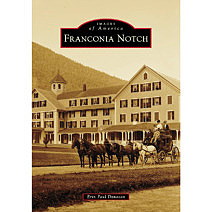Presidential Range, Random History – The Presidential Range in the New Hampshire White Mountains is known worldwide for having some of the worst weather in the world. And the main attraction of the range is the mighty Mount Washington. At 6,288 feet, Mount Washington is the highest peak in the Northeastern United States. And with the famed Appalachian Trail traveling through this scenic mountain range, it is a busy area.
The first recorded ascent, Darby Field in 1642, and fatality, Frederick Strickland in 1849, on Mount Washington has been well-publicized and is known among outdoor enthusiasts who play in the White Mountains. And because of the significance of these events, some of the history surrounding the Presidential Range is overlooked. So included here are a few tidbits of history about this fascinating mountain range.
Crawford Path is the oldest continuously-used mountain trail in America. This eight and half mile historic path came to be in 1819 when Abel Crawford and his son, Ethan Allen, began building a trail to the summit of Mount Pierce, formerly Mount Clinton. Once north of Mount Pierce, the Crawford Path follows the famed Appalachian Trail corridor to the summit of Mount Washington. From 1840-1870 it was used as a bridle path. And in 1840, at age 75, Abel Crawford made the first horseback ascent of Mount Washington.
2019 is Crawford Path’s 200th anniversary and the White Mountain Trail Collective, a 501(c)(3) organization, is currently making many needed improvements to the trail. This trail will be around for many years to come.
In July 1820, the Weeks-Brackett party, guided by Ethan Allen Crawford, hiked Mount Washington. The purpose of this hike was to give names to all the mountains in the Presidential Range (Mount Washington was already named). Mount Adams, Jefferson, Madison, and Monroe were named after the four presidents that held the position up until that point.
When the Weeks-Brackett party (1820) ran out of presidents, they named the remaining mountains in the Presidential Range after notable individuals. Between Mount Eisenhower and Mount Monroe in the Southern Presidential Range is Mount Franklin, named after Benjamin Franklin.
On the Ammonoosuc River, near the Ammonoosuc Ravine Trail, is a series of cascades once known as Captain Dodge’s Cascades. These cascades are named for Captain John W. Dodge of Hampton Falls, New Hampshire. He was the first manager of the second Summit House on Mount Washington, which opened in July 1873. After he died, his wife, Harriet D. Dodge managed the Summit House for a number of seasons before retiring. The second Summit House was destroyed by fire on June 18, 1908.
The Jewell Trail is named for Sergeant Winfield S. Jewell from Lisbon, New Hampshire. He was an Army Signal Corps observer on Mount Washington from 1878-1880. And on April 12, 1884, while on the Greely expedition to the Arctic (Lady Franklin Bay Expedition), Jewell died of starvation. Out of the 25 men on the three year Greeley expedition (1881–1884), only six survived.
Henry W. Ripley of North Conway, New Hampshire, discoverer of Ripley Falls in Crawford Notch, was an avid hiker in the 1800s. He was a regular visitor to the White Mountains, and its believed that he hiked Mount Washington at least eighty-five times during the summer and winter months. In today’s peakagging craze, this would be considered a grand accomplishment. No smartphone, or social media, how did he do it? 🙂
Cut in 1909 and 1910, the Six Husbands Trail originally began off the Tuckerman Ravine Trail, crossed the auto road, traveled through the Great Gulf, and ended on the summit of Mount Jefferson. Today, the southern extension of the original trail is the Wamsutta Trail and the Alpine Garden Trail; these name changes may have happened in the 1930s, possibly 1931/1932. As for the trail name, it has a connection to Chief Weetamoo, a female Indian Chief of the Pocasset tribe. She had six husbands, and this trail is named for the six husbands. One of her husbands, Wamsutta also has a trail named for him in the Presidential Range, the Wamsutta Trail.
Named Mount Pleasant by the Weeks-Brackett naming party in July of 1820, this mountain in the Southern Presidential Range was renamed Mount Eisenhower after President Dwight D. Eisenhower died in March of 1969. He was the 34th U.S. President. This mountain has also been called Mount Prospect, Pleasant Dome, and Dome Mountain.
Madison Spring Hut is located just below Mount Madison. Originally built in 1888, this hut has been renovated a few times over the years, and it was recently renovated again in the fall and spring months of 2010-2011. Mount Madison, named after the fourth U.S. President, James Madison is the northernmost peak in the Presidential Range.
If hiking in the Presidential Range or the scenic Appalachian Trail (Crawford Path and Gulfside Trail), take some time to enjoy the history of this breathtaking mountain range.
Happy image making..
To license any of the photos in this blog article for publications, click on the photo.
© Erin Paul Donovan. All rights reserved | Historic Information Disclaimer | Purchase Our EB&L Railroad Book
Bibliography:
Donovan, Erin Paul. “Crawford Path, White Mountains.” ScenicNH Photography LLC, 14 Mar 2015, https://www.scenicnh.com/blog/2015/03/crawford-path-white-mountains/.
Donovan, Erin Paul. “Ripley Falls, Crawford Notch.” ScenicNH Photography LLC, 25 Jun 2019, https://www.scenicnh.com/blog/2019/06/ripley-falls-crawford-notch/.
Julyan, Robert, Julyan, Mary. Place Names of the White Mountains, Hanover, NH: United Press of New England, 1993.
“The Greely Expedition.” PBS, Public Broadcasting Service, https://www.pbs.org/wgbh/americanexperience/films/greely/.
Owner of ScenicNH Photography LLC
Erin Paul is a professional photographer, writer, and author who specializes in environmental conservation and historic preservation photography mainly in the New Hampshire White Mountains. His work is published worldwide, and publication credits include: Appalachian Mountain Club, Appalachian Trail Conservancy, Backpacker Magazine, and The Wilderness Society. He has written two photo history books about the White Mountains: the East Branch & Lincoln Railroad (2018) and Franconia Notch (2024).













Oops, guess I gotta reread my history books. Thanks for the correction.
Anytime Mike. I love all those history books. 🙂
As always, spoken or unspoken, thanks for the great history. I didn't realize until only recently the first Crawford Path went up near the Cog. I *think* the remnants of one of the shelters may still be there, but it's only on my to do list…
Ooo, and I smell a new list! The Ripley 85! Climb Washington 85 times with no technology! Bonus points for waiting in line to actually stand at the summit!
Thanks Mike! Glad you enjoyed it. That is the “Second Crawford Path”. It was built in 1820 or 1821 (after the original Crawford Path was completed). And after Horace Fabyan improved this path for horse travel in the 1840s it become known as the Fabyan Bridle Path.
The Ripley 85 has a nice ring to it. 🙂